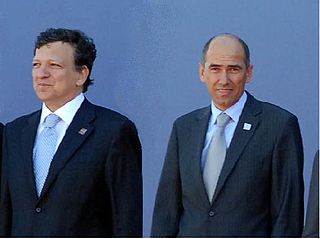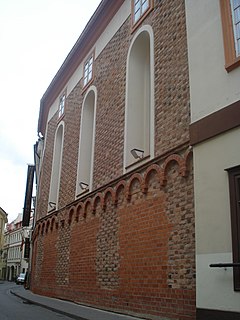 W
WAct on Illegality of the Communist Regime and on Resistance Against It is an act passed on July 9, 1993 in the Parliament of the Czech Republic. This act declared the Communist regime in Czechoslovakia as illegal and the Communist Party of Czechoslovakia as a criminal organisation. Most of the act is formulated as a resolution.
 W
WThe Black Ribbon Day, officially known in the European Union as the European Day of Remembrance for Victims of Stalinism and Nazism, is an international day of remembrance for victims of totalitarian regimes, specifically Stalinist, communist, Nazi and fascist regimes. Formally recognised by the European Union, the Organization for Security and Co-operation in Europe and a number of other countries, it is observed on 23 August and symbolizes the rejection of "extremism, intolerance and oppression". The purpose of the Day of Remembrance is to preserve the memory of the victims of mass deportations and exterminations, while promoting democratic values with the aim to reinforce peace and stability in Europe. It is one of the two official remembrance days or observances of the European Union, alongside Europe Day. Under the name Black Ribbon Day it is also an official remembrance day of Canada, the United States and other countries. The European Union has used both names alongside each other.
 W
WCrimes Committed by Totalitarian Regimes are reports and proceedings of the European public hearing organised by the Slovenian Presidency of the Council of the European Union and the European Commission. The Hearing was organised in response to the request made by the Justice and Home Affairs Council of the European Union on 19 April 2007.
 W
WThe Genocide and Resistance Research Centre of Lithuania is a state-funded research institute in Lithuania dedicated to "the study of genocide, crimes against humanity, and war crimes in Lithuania; the study of the persecution of local residents by occupying regimes; the study of armed and unarmed resistance to occupying regimes; the initiation of the legal evaluation of the activities of the organisers and implementers of genocide; and the commemoration of freedom fighters and genocide victims." The centre was founded on 25 October 1992 by the Supreme Council of the Lithuanian Republic as the "State Genocide Research Centre of Lithuania". It is a member organisation of the Platform of European Memory and Conscience.
 W
WHouse of Terror is a museum located at Andrássy út 60 in Budapest, Hungary. It contains exhibits related to the fascist and communist regimes in 20th-century Hungary and is also a memorial to the victims of these regimes, including those detained, interrogated, tortured or killed in the building.
 W
WThe Institute for the Investigation of Communist Crimes in Romania is a government-sponsored organization whose mission is to investigate the crimes and abuses conducted while Romania was under communist rule, prior to December 1989. Following the Romanian Revolution of 1989, Romania’s Communist government was overthrown and a democratic president was elected in May 1990.
 W
WThe Institute for the Study of Totalitarian Regimes is a Czech government agency and research institute. It was founded by the Czech government in 2007 and is situated at Siwiecova street, Prague-Žižkov.
 W
WMemorial was formally established in Moscow in January 1989 as an international historical and civil rights society. Between 1987 and 1990, while the USSR was still in existence, 23 branches of the society were set up and became active. When the Soviet Union collapsed, branches of Memorial in east and south Ukraine remained affiliated to the Russian network.
 W
WThe Memorial to the Victims of the Deportation of 1944 was a Chechen memorial in the center of Grozny, capital of Chechnya, opened in 1992 to commemorate the Chechen victims of the Stalinist regime during and following their forced relocation to Central Asia in February 1944. The monument was sculpted by Chechen sculptor Darchi Khaskhanov.
 W
WThe Museum of Communism in Czech Republic, located at V Celnici 4 in Prague, Czech Republic, is a museum dedicated to presenting an account of the post–World War II Communist regime in Czechoslovakia in general and Prague in particular. The Museum of Communism offers an immersive look at life behind the Iron Curtain. Genuine artifacts, interviews, archive photographs, artworks, historical documents and large scale installations that bring an entire chapter of history to life.
 W
WThe National Memory Institute is a Slovak public institution that holds the police records of the fascist Slovak State and communist Czechoslovak Socialist Republic regimes that ruled Slovakia during the twentieth century. The institute also promotes research into these periods of Slovak history and educates the general public of this history. It publishes a journal, Pamäť národa, which is currently edited by Róbert Letz. The founder of the institute was Ján Langoš, who served as director until his death in a car crash in 2006.
 W
WHildigund Neubert is the daughter of an East German Pastor-Theologian who became a professional musician. As the pressures for change in the one-party dictatorship intensified, thanks both to the bankruptcy of the state and to the winds of Glasnost blowing across from, of all places, Moscow, she found herself drawn by circumstances into politics. At the time of East Germany's "peaceful revolution" she was in East Berlin, a permanent presence at the control centre of Demokratischer Aufbruch . A feature of those months was the dispersed character of the uprisings that destroyed the dictatorship: it is misleading to think in terms of any sort of central "guiding hand" controlling developments. Nevertheless, DA was one of a number of movements and organisations that became key to focusing the energies of hundreds of thousands of pro-democracy campaigners and demonstrators, in ways that led, in March 1990, to the only free and fair parliamentary election in the history of the "German Democratic Republic" and thereafter, more indirectly, to reunification in October 1990.
 W
WThe Museum of the Occupation of Latvia is a museum and historic educational institution located in Riga, Latvia. It was established in 1993 to exhibit artifacts, archive documents, and educate the public about the 51-year period in the 20th century when Latvia was successively occupied by the USSR in 1940–1941, then by Nazi Germany in 1941–1944, and then again by the USSR in 1944–1991. Official programs for visits to Latvia of top level representatives of other countries normally include a visit to the Museum of the Occupation.
 W
WPost Bellum is a Czech educational nonprofit organization based in Prague. The organization was formed in 2001 by a group of historians and journalists with the aim of increasing public knowledge of the 20th century history of the Czech Republic and neighboring countries, especially among younger generations. Post Bellum has collected thousands of witness accounts by conducting interviews with people who lived through significant periods in history as part of their documentation project, Stories of the 20th Century, and for their online archive, Memory of Nations. They organize various other projects and activities to raise awareness of modern history. The stated aim of the organisation is to "understand the past through authentic testimony". Post Bellum is an associate member organization of the Platform of European Memory and Conscience.
 W
WThe Prague Declaration on European Conscience and Communism was a declaration which was initiated by the Czech government and signed on 3 June 2008 by prominent European politicians, former political prisoners and historians, among them former Czech President Václav Havel and future German President Joachim Gauck, calling for "Europe-wide condemnation of, and education about, the crimes of communism." Much of the content of the declaration reproduced demands formulated by the European People's Party in 2004, and draws heavily on totalitarianism theory.
 W
WThe Taiwan Foundation for Democracy is a non-profit organisation headquartered in Taipei. Originally proposed by the Ministry of Foreign Affairs of the Republic of China, the foundation's purpose is to promote democracy around the world. The Foundation was established in June 2003 as a non-partisan, non-profit organization.
They Chose Freedom is a four-part TV documentary on the history of political dissent in the USSR from the 1950s to the 1990s. It was produced in 2005 by Vladimir V. Kara-Murza.
 W
WThe Victims of Communism Memorial Foundation (VOC) is a non-profit anti-communist organization in the United States, authorized by a unanimous Act of Congress in 1993 for the purpose of "educating Americans about the ideology, history and legacy of communism."